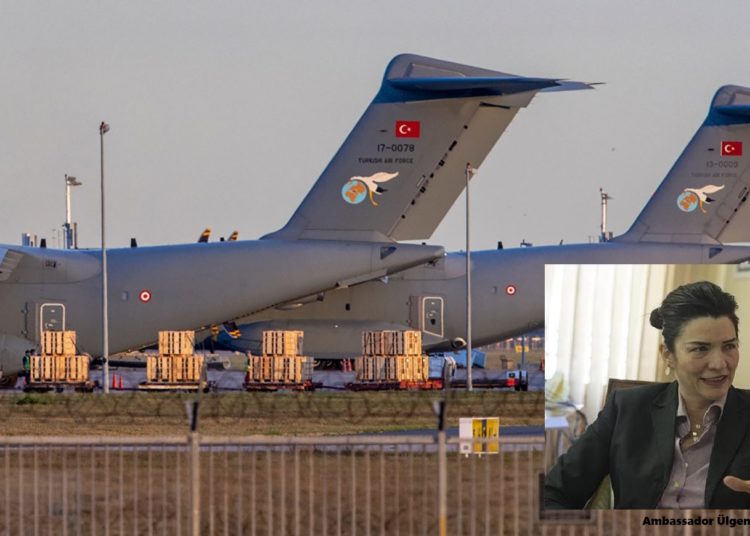Nordic Monitor
Six Turkish military cargo aircraft traveled from Turkey to South Africa with a small amount of medical supplies on board one plane to pick up military equipment purchased from defense industry provider Rheinmetall Denel Munition (RDM) amid the coronavirus, the Daily Maverick (DM) reported.
According to DM, a South African online newspaper, six Turkish A400M military cargo aircraft, each of which can carry up to 37 tons, landed in Cape Town in pairs to pick up munitions from RDM. “The last batch left on Monday,” DM stated.
Despite local lockdown regulations that only allow for the transport of essentials such as food and medicine, the Turkish cargo aircraft left South Africa loaded with military equipment, DM said.
Only the first A400M brought a small cargo of medical supplies to South Africa on Thursday. The five other aircraft arrived in Cape Town without medical supplies on board. Speaking to DM, Turkish Ambassador to South Africa Elif Çomoğlu Ülgen described the content of Turkey’s “relatively small donation” to South Africa as 100,000 surgical masks, 100 N95 masks, 500 protective overalls, 500 face shields, 500 medical safety goggles, 200 liters of hand sanitizer and one disinfectant tunnel.
The export of military equipment to Turkey has sparked criticism in South Africa due to Turkey’s involvement in Libya and Syria. Banker-turned-arms-deal-activist Terry Crawford-Browne told DM that “the National Conventional Arms Control Committee (NCACC) has failed in its responsibilities as it is suspected that the munitions were destined for use in Libya or Syria.”
The NCACC is South Africa’s national arms trade regulator monitoring the export of weapons to countries that abuse human rights. In January 2020 South Africa blocked arms exports to Saudi Arabia, the United Arab Emirates, Oman and Algeria after those countries refused to allow its officials to inspect their facilities to verify compliance with the South African National Conventional Arms Control Act.

Turkey’s operation from South Africa amid the coronavirus pandemic also raised questions over whether Turkish cargo aircraft, authorized for medical supplies transportation, are also carrying explosives and military equipment to Libya, where President Recep Tayyip Erdoğan’s government has deployed troops and Syrian jihadists. Libya is among the 57 countries to which Turkey has sent medical supplies.
In April the European Union launched a new Mediterranean naval and air mission, named Irini, to monitor the UN-mandated arms embargo on Libya, imposed by UN Security Council Resolution 1970 (2011), and to stop arms shipments to the war-torn North African country.

Turkey has been criticized for its involvement in the domestic affairs of African countries. In December 2019 Niger’s National Security Service arrested “three terrorists,” including two Turkish citizens, flying in from Turkey on Turkish Airlines (THY). The three are accused of affiliation with the Islamic State in the Greater Sahara (IS-GS).
With reference to local security sources, Al Arabiya claimed that “Turkey would use the airport [constructed by Turkish companies] and Turkish Airlines flights to Niamey and Bamako to support extremists in southern Libya and destabilize neighboring Nigeria.”
Similarly, the Nigerian government has investigated claims that the Turkish government is sending weapons to the Nigerian-based terrorist organization Boko Haram, which has pledged allegiance to the Islamic State in Syria (ISIS).
In 2014 a leaked recording of a conversation that took place between an adviser of Erdoğan and an official from THY revealed that Turkey’s national airline and the Turkish government were alleged to have been involved in a transfer of arms to Nigeria. According to the voice recording uploaded onto YouTube, Mehmet Karataş, executive assistant to the chief executive officer of THY, is heard telling Erdoğan adviser Mustafa Varank, now the industry minister, that he feels guilty about the transfer of weapons to Nigeria. Karataş is heard saying in the recording, “I don’t know whether these [weapons] will kill Muslims or Christians.” Varank says he had not had a chance to talk to the head of the National Intelligence Organization (MIT), Hakan Fidan, and would get back to Karataş as soon as he was able to speak to the intel chief. The recording was believed to be yet another piece of evidence of the Erdogan government’s aiding and abetting of armed jihadist groups in other countries including Boko Haram militants in Nigeria.

Turkish Ambassador Ülgen confirmed that the cargo was military ammunition bought from RDM and stated that ”the outbound cargo was destined for practice and exercises by the Turkish military.”
According to its web page, RDM “specializes in the development, design and manufacture of large- and medium-calibre ammunition families and is a world leader in the field of artillery, mortar and infantry systems as well as plant engineering.”
“The supplies are destined for the Machinery and Chemical Industry Institution (MKE) which deals with explosives and ammunition and processes these for the Turkish ministry of defence. … Since the cargo is explosives, they have to be transported in military aircraft, but when the airspace across Africa went into lockdown, flyover permissions became difficult to obtain,” MD reported.
Speaking to MD, military analyst Helmoed-Römer Heitman said the transaction could likely have been for pyrotechnics such as flares, smoke grenades and blank rounds if they are to be used in military exercises. He also said it could have included rocket motors or missile warheads. “The Turks have a design office up here [in South Africa] that designs missiles for production in Turkey, and I suppose it is possible that some initial batches might use South African bits,” he said.

Nordic Monitor previously reported how the Turkish Embassy, currently run by Ambassador Ülgen, spied on the activities of critics of President Erdoğan in South Africa, profiled their organizations and listed their names as if they were part of a terrorist organization.
Ambassador Ülgen has also been facilitating the establishment of Turkish Islamist entities, mainly the Maarif Foundation, a Turkish-government-funded entity that intends to expand its education network in South Africa and its neighborhood. Ülgen is married to Sinan Ülgen, a former diplomat who now runs the Istanbul-based EDAM think tank.












